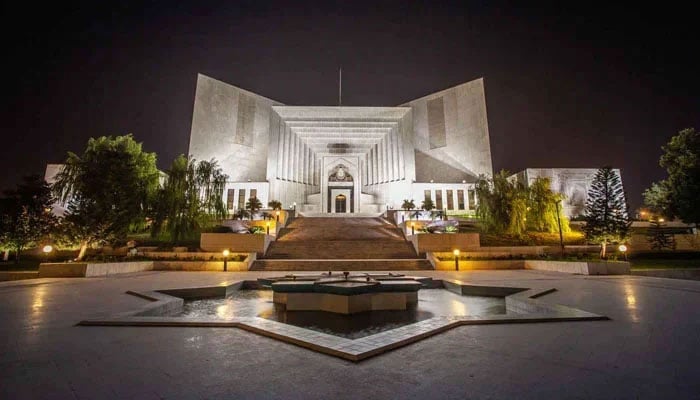Plots allotment: SC reserves verdict in pleas against IHC decision
Some 35 serving and retired government employees had challenged the verdict of IHC
ISLAMABAD: The Supreme Court Tuesday reserved judgment in the petitions challenging verdict of Islamabad High Court (IHC), scrapping new policy of allotting government’s plots to civil servants, generals and journalists in sectors F-14 and F-15 of federal capital.
A three-member bench of the apex court headed by Justice Munib Akhtar and comprising Justice Muhammad Ali Mazhar and Justice Ayesha A Malik reserved the verdict. The court held parties may submit written submissions within three weeks if they wish.
Some 35 serving and retired government employees had challenged the verdict of IHC. Former IHC Chief Justice Athar Minallah on February 3, 2022, while hearing a petition filed by Ednan Syed and 10 others against Federal Government Employees Housing Foundation (FGEHF), had scrapped the new policy of allotting government’s plots to civil servants, judges, generals and journalists in federal capital.
The IHC had held the Revised Policy and the scheme pursuant thereto, intended to be launched in sectors F-12, G-12, F-14 and F-15, are in derogation of public interest and violative of constitutionally guaranteed rights of people at large.
Additional Attorney General Aamir Rehman also opposed the IHC judgment, saying a bench of Supreme Court has given a decision in favour of using the housing society for public purposes.
He submitted the High Court upheld the decision of its single-member bench and struck down the entire scheme. The revised policy was first approved by Federal Cabinet on the direction of the High Court, he said.
He further submitted the housing scheme did not cause loss of public money, adding the High Court passed the decision without giving notice to Attorney General.
Hafiz Ehsan Khokhar, counsel for the petitioners, contended “Impugned judgment is not legally sustainable since the High Court is not authorised to exercise suo motu jurisdiction under Article 199 of the Constitution”.
He submitted Division Bench of High Court completely disregarded true dispute between the parties and went beyond the scope of the writ petition, from which Intra Court Appeal originated. The impugned judgment is a judicial overreach and should be overturned, he argued.
He contended the High Court has no legal authority to intervene in matters of federal government policy, particularly since no side has specifically challenged it in court on the grounds of malfeasance or any violation of fundamental rights.
He claimed the High Court concealed certain points from federal cabinet, failing to acknowledge these issues had not been raised before the court or addressed by Supreme Court in a previous round of litigation involving the same housing sectors.
-
 Critics Target Palace Narrative After Andrew's Controversy Refuses To Die
Critics Target Palace Narrative After Andrew's Controversy Refuses To Die -
 Sarah Ferguson’s Delusions Take A Turn For The Worse: ‘She’s Been Deserted’
Sarah Ferguson’s Delusions Take A Turn For The Worse: ‘She’s Been Deserted’ -
 ICE Agents 'fake Car Trouble' To Arrest Minnesota Man, Family Says
ICE Agents 'fake Car Trouble' To Arrest Minnesota Man, Family Says -
 Camila Mendes Reveals How She Prepared For Her Role In 'Idiotka'
Camila Mendes Reveals How She Prepared For Her Role In 'Idiotka' -
 China Confirms Visa-free Travel For UK, Canada Nationals
China Confirms Visa-free Travel For UK, Canada Nationals -
 Inside Sarah Ferguson, Andrew Windsor's Emotional Collapse After Epstein Fallout
Inside Sarah Ferguson, Andrew Windsor's Emotional Collapse After Epstein Fallout -
 Bad Bunny's Star Power Explodes Tourism Searches For His Hometown
Bad Bunny's Star Power Explodes Tourism Searches For His Hometown -
 Jennifer Aniston Gives Peek Into Love Life With Cryptic Snap Of Jim Curtis
Jennifer Aniston Gives Peek Into Love Life With Cryptic Snap Of Jim Curtis -
 Prince Harry Turns Diana Into Content: ‘It Would Have Appalled Her To Be Repackaged For Profit’
Prince Harry Turns Diana Into Content: ‘It Would Have Appalled Her To Be Repackaged For Profit’ -
 Prince William's Love For His Three Children Revealed During Family Crisis
Prince William's Love For His Three Children Revealed During Family Crisis -
 Murder Suspect Kills Himself After Woman Found Dead In Missouri
Murder Suspect Kills Himself After Woman Found Dead In Missouri -
 Sarah Ferguson's Plea To Jeffrey Epstein Exposed In New Files
Sarah Ferguson's Plea To Jeffrey Epstein Exposed In New Files -
 Prince William Prepares For War Against Prince Harry: Nothing Is Off The Table Not Legal Ways Or His Influence
Prince William Prepares For War Against Prince Harry: Nothing Is Off The Table Not Legal Ways Or His Influence -
 'How To Get Away With Murder' Star Karla Souza Is Still Friends With THIS Costar
'How To Get Away With Murder' Star Karla Souza Is Still Friends With THIS Costar -
 Pal Reveals Prince William’s ‘disorienting’ Turmoil Over Kate’s Cancer: ‘You Saw In His Eyes & The Way He Held Himself’
Pal Reveals Prince William’s ‘disorienting’ Turmoil Over Kate’s Cancer: ‘You Saw In His Eyes & The Way He Held Himself’ -
 Poll Reveals Majority Of Americans' Views On Bad Bunny
Poll Reveals Majority Of Americans' Views On Bad Bunny




